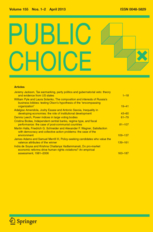
Forecast Dispersion, Dissenting Votes, and Monetary Policy Preferences of FOMC Members: The Role of Individual Career Characteristics and Political Aspects
Using data from 1992 to 2001, we study the impact of members’ economic forecasts on the probability of casting dissenting votes in the Federal Open Market Committee (FOMC). Employing standard ordered probit techniques, we find that higher individual inflation and real GDP growth forecasts (relative to the committee’s median) significantly increase the probability of dissenting in favor of tighter monetary policy, whereas higher individual unemployment rate forecasts significantly decrease it. Using interaction models, we find that FOMC members with longer careers in government, industry, academia, non-governmental organizations (NGOs), or on the staff of the Board of Governors are more focused on output stabilization, while FOMC members with longer careers in the financial sector or on the staffs of regional Federal Reserve Banks are more focused on inflation stabilization. We also find evidence that politics matters, with Republican appointees being much more focused on inflation stabilization than Democratic appointees. Moreover, during the entire Clinton administration ‘natural’ monetary policy preferences of Bank presidents and Board members for inflation and output stabilization were more pronounced than under periods covering the administrations of both George H.W. Bush and George W. Bush, respectively.




